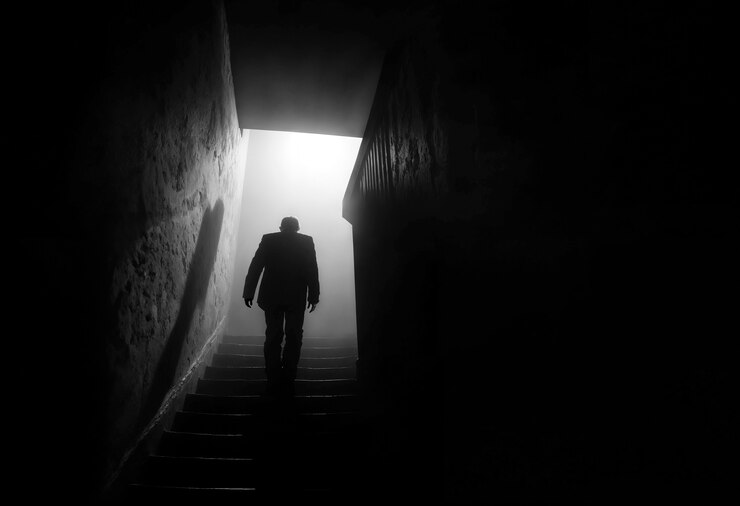Have you ever found yourself in a situation where the perfect response struck your mind long after the conversation ended? Oh, who am I kidding – of course you have. We all have our “should’ve said” hall of fame moments. This phenomenon, known as “l’esprit de l’escalier” or “staircase wit,” is that special brand of torture where your brain decides to be brilliant exactly when it doesn’t matter anymore.
Today, we’ll dissect delayed responses, uncover perfect retorts that arrived fashionably (and uselessly) late, and master those moments when your wit decides to vanish without warning – only to reappear when you’re alone in the shower three days later.
Have you ever found yourself in a situation where the perfect response struck your mind long after the conversation ended? […]
The Art of the Comeback: Why Timing is Everything (and Why Yours Is Terrible)

We’ve all been there. You’re locked in a heated discussion when someone fires a comment that catches you off guard. Your mind – that brilliant, quick-witted organ that can remember every embarrassing thing you’ve ever done since third grade – suddenly becomes as useful as a chocolate teapot. Your mouth opens, closes, and emits something resembling “Uhhh” while your dignity quietly exits the room. It’s only later, while dissecting the conversation with your bathroom mirror at 2 AM, that the perfect comeback suddenly erupts in your consciousness.
This experience is so universal that the French have crafted a term for it: “l’esprit de l’escalier,” which translates to “staircase wit.” Philosopher Denis Diderot forged this phrase, capturing the feeling of conjuring the perfect retort while descending the stairs after a conversation. Because nothing says “intellectual victory” quite like muttering zingers to yourself in an empty stairwell.
Several factors sabotage our ability to deliver the perfect comeback on the spot:
- Stress and pressure: When thrust into the spotlight, your stress levels surge faster than your coffee bill at a hipster café, blocking your ability to think clearly and creatively.
- Limited processing time: Your brain demands time to digest information and craft responses. Sadly, social norms frown upon saying, “Hold that thought for 20 minutes while I workshop a devastating reply.”
- Social anxiety: Fear of confrontation can paralyze you faster than seeing your ex at the grocery store when you’re wearing sweatpants and haven’t showered in two days.
- Lack of practice: Quick wit is a skill that sharpens with deliberate practice. Unfortunately, there’s no app for that. Yet.
Famous Examples of Delayed Comebacks (Because Even the Greats Choke)
Even the most eloquent individuals have experienced moments where the perfect retort arrived too late:

John Wilkes vs. Earl of Sandwich
The Earl of Sandwich once said to John Wilkes, “Sir, I do not know whether you will die on the gallows or of the pox.” Wilkes replied, “That depends, my lord, on whether I embrace your lordship’s principles or your mistress.” While often quoted as a quick-witted response, some historians suggest Wilkes actually thought of this comeback much later. That’s right – even historical burns may have been workshopped after the fact. Feeling better about your own delayed comebacks yet? No? Well, keep reading.
Winston Churchill’s Delayed Wit
Winston Churchill, known for his sharp tongue, wasn’t immune to the occasional delayed response. After a particularly heated debate in Parliament, Churchill reportedly thought of the perfect retort while in the bathroom. He rushed back to the chamber, but the moment had passed, and his brilliant comeback went unspoken. That’s right – even the man who led Britain through WWII sometimes had to flush his best comebacks down the toilet. Literally.
Mark Twain’s Missed Opportunity
Mark Twain once recounted being insulted at a party and failing to think of a suitable response. It was only later that night, while lying in bed, that he came up with a series of devastating comebacks—long after the opportunity to deliver them had passed.
The Psychology Behind Delayed Responses
Why do perfect comebacks often arrive too late? The answer lies in how our brains process information. When we’re in a social situation, our minds juggle multiple tasks:
- Listening to and interpreting what’s being said
- Reading non-verbal cues and body language
- Managing our own emotions and reactions
- Formulating an appropriate response
- Considering the potential consequences of our words.
All these processes require time and mental energy. In the heat of the moment, our brains prioritize immediate responses over crafting the perfect witty comeback. It’s only later, when we’re relaxed and have time to reflect, that our minds can fully process the situation and generate that brilliant retort.
“The human brain is a complex organ with the wonderful power of enabling man to find reasons for continuing to believe whatever it is that he wants to believe.” – Voltaire
The Frustration of Missed Opportunities
The feeling of coming up with the perfect comeback too late can be incredibly frustrating. It’s not just about winning an argument; it’s about feeling confident and in control of our thoughts and words.
When we fail to deliver a witty response in the moment, we might experience:
● Self-doubt about our quick-thinking abilities
● Regret about not saying what we wanted to
● Anger and frustration with ourselves
● Obsessively replaying the scenario in our minds
These feelings are normal, but it’s important not to let them consume us. Remember that even the wittiest people sometimes find themselves at a loss for words.
Strategies for Supercharging Your Comeback Game (Yes, There’s Hope for You)
While we can’t always dictate when inspiration strikes (apparently your brain prefers to do its best work during your commute home), there are powerful ways to boost your chances of delivering a razor-sharp, timely response:

- Master Active Listening (Instead of Planning Your Grocery List)
Often, we’re so consumed with crafting our response that we fail to absorb what’s being said. By mastering active listening, we can penetrate the context and nuances of the conversation, arming ourselves with ammunition for crafting devastating responses. Novel concept: actually paying attention might help you respond better. Who knew? - Expand Your Vocabulary Arsenal (Beyond Just “Whatever” and Eye Rolls)
A robust vocabulary provides you with powerful weapons when constructing comebacks. Devour books, conquer new words, and deploy them in everyday conversations. Nothing says “I win” like making someone reach for a dictionary mid-argument. - Dissect Witty Exchanges (AKA Binge-Watch More Comedy)
Scrutinize clever exchanges in movies, TV shows, and books. Deconstruct what propels certain comebacks to effectiveness and unlock the underlying architecture of a brilliant retort. Finally, a legitimate reason to re-watch all those sitcoms: “It’s not procrastination, it’s comeback research.” - Embrace Strategic Imperfection (Sometimes “Whatever” IS the Perfect Response)
Remember that not every response demands a perfectly engineered zinger. Sometimes, a straightforward, authentic reaction can slice through pretense more effectively than a contrived comeback. A well-timed eye roll can be worth a thousand words. Just ask any teenager. - Drill Improvisation Skills
Plunge into an improv class or challenge friends with word games. These activities will forge your ability to think under pressure and fire back responses in social situations.
When Delayed Comebacks Can Be a Good Thing (No, Really)
While it’s frustrating to think of the perfect retort too late, there are times when a delayed response can actually be beneficial:

- Avoiding conflict: Sometimes, not saying the first thing that comes to mind can prevent unnecessary arguments or hurt feelings. And by “prevent unnecessary arguments,” I mean
“prevent you from being uninvited to future family gatherings.” - Maintaining professionalism: In work situations, taking time to formulate a thoughtful response can be more appropriate than delivering a quick, potentially offensive comeback.
Because “Would you like fries with that insult?” isn’t a great career advancement strategy. - Reflection and growth: Thinking about what you could have said gives you the opportunity to prepare for similar encounters in the future. Or, you know, to obsessively rehearse comebacks for scenarios that will never happen again.
- Preserving relationships: A witty but hurtful comeback might feel good in the moment but could damage important relationships in the long run. Sometimes silence is golden, especially
when the alternative is sleeping on the couch for a week.
The Art of the Delayed Comeback
If you’ve thought of the perfect comeback after the fact, all is not lost. There are ways to use your delayed wit effectively:

- The Follow-up
If appropriate, you can bring up the topic again with the person and say something like, “You know, I’ve been thinking about our conversation earlier, and I realized…” - The Self-deprecating Joke
Share your delayed comeback with friends, framing it as a funny story about your own slow wit. This can turn a frustrating experience into an entertaining anecdote. - The Written Response
In the age of social media and text messaging, you can sometimes continue a conversation online, giving you the opportunity to use your delayed comeback. - The Learning Experience
Use your delayed comebacks as practice for future encounters. Mentally rehearse how you’d use that response if a similar situation arises again.
Embracing the Wisdom of the Staircase
While it’s natural to feel frustrated when the perfect comeback arrives too late, try to embrace the “wisdom of the staircase” as a chance for growth and self-reflection.
Here are some positive ways to look at delayed comebacks:
- They show that your mind is still engaged and processing the conversation, even after it’s over.
- Delayed responses often give you time to craft more thoughtful and nuanced comebacks.
- The frustration of a missed opportunity can motivate you to be more prepared in future interactions.
- Recognizing your delayed wit can be a source of amusement and self-deprecating humor.
“I wish I had an answer to that because I’m tired of answering that question.” – Yogi Berra
Claiming the Last Word on Late Comebacks (Better Late Than Never, Right?)

The ability to launch the perfect retort instantly is a skill that even the most razor-tongued among us battle with at times. While it frustrates us to conjure the ideal comeback too late, these flashes of delayed brilliance represent a universal aspect of human interaction. It’s like your brain’s way of saying, “I got your back… eventually.”
Instead of brooding over missed opportunities, channel your energy into sharpening your communication skills, mastering active listening, and transforming the occasional bout of “staircase wit” into a springboard for growth. Your next brilliant comeback might strike at precisely the right moment to silence the room. Or more likely, you’ll think of it while brushing your teeth tomorrow morning.
Remember, life doesn’t demand a perfect response at every turn—thank goodness, or we’d all be permanently speechless. So the next time you stand on that metaphorical staircase, a brilliant comeback blazing in your mind but no audience to witness it, celebrate your creativity. After all, a delayed razor-sharp response still cuts deeper than no wit at all. And hey, there’s always the group chat to appreciate your belated genius.







